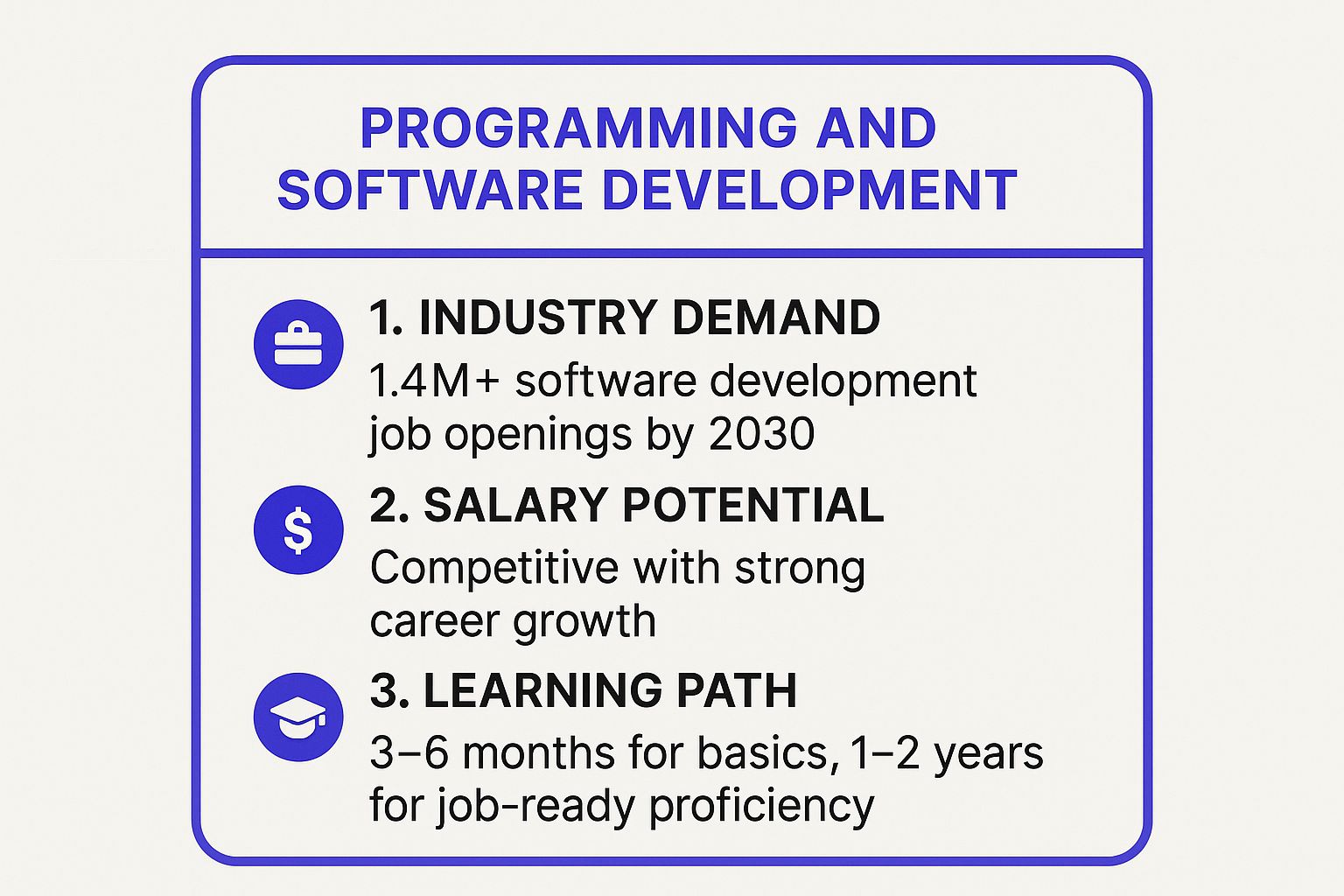What Are Hard Skills Examples? Top 7 You Should Know
Before diving into the list, it's crucial to understand what separates hard skills from their counterpart, soft skills. Hard skills are teachable, quantifiable abilities or knowledge sets that can be easily demonstrated and measured. Think of them as the technical proficiencies you gain through education, training, or hands-on experience, such as coding, speaking a foreign language, or using specific software.
Soft skills, on the other hand, are the interpersonal attributes that define how you work and interact with others, including communication, teamwork, and problem-solving. While soft skills are vital for cultural fit, hard skills are often the non-negotiable requirements that get your resume past an initial screening. Recruiters and Applicant Tracking Systems (ATS) frequently scan for keywords related to specific hard skills.
Knowing what are hard skills examples and how to showcase them effectively is the first step toward building a compelling application that opens doors. This guide will explore seven of the most valuable hard skills today, providing not just definitions but strategic insights to help you leverage them in your career.
1. Programming and Software Development
Programming is the foundational skill of writing, testing, and maintaining code to build software applications, websites, and systems. It requires a deep understanding of logic, algorithms, and data structures in languages like Python, Java, or C++. This hard skill is essential in nearly every industry today, powering everything from the apps on your phone to complex enterprise systems.
Strategic Value and Application
This skill is highly transferable and in constant demand. For example, a backend developer at Netflix uses programming to optimize streaming infrastructure, ensuring millions of users can watch content seamlessly. Similarly, Tesla's software engineers develop and refine the complex algorithms that power its autonomous driving systems. These roles require not just coding ability but also problem-solving and system-level thinking, making it a powerful skill for any resume.
Key Data on Programming Careers
To give you a clearer picture of the career outlook, the following summary box highlights key industry data on demand, salary, and learning timelines.

The data clearly indicates strong, sustained demand for developers, coupled with competitive compensation and a feasible learning curve for dedicated individuals. For those looking to specialize further, skills in using tools for AI code generation can significantly boost productivity and open up new career paths.
Actionable Tips for Aspiring Developers
To build this hard skill effectively, focus on practical application.
- Build Projects: Move beyond tutorials and create your own applications to solve real problems.
- Contribute to Open Source: Gain collaborative experience by contributing to projects on platforms like GitHub.
- Practice Consistently: Use sites like LeetCode or HackerRank to sharpen your problem-solving skills.
2. Data Analysis and Statistical Skills
Data analysis is the process of inspecting, cleaning, modeling, and interpreting data to uncover actionable insights and support strategic decision-making. This hard skill involves proficiency in statistical methods and tools like SQL, Excel, Python, and Tableau to transform raw numbers into compelling business intelligence. In today's data-driven world, it is a critical function for optimizing processes and identifying new opportunities.

Strategic Value and Application
This skill is invaluable for turning abstract data into tangible business outcomes. For example, Netflix analyzes vast amounts of viewing data to decide which original series to produce, minimizing risk and maximizing viewership. Similarly, a marketing analyst at Spotify uses data to refine playlist recommendation algorithms, enhancing user engagement and retention. These roles demonstrate how data analysis directly impacts product development and customer experience, making it a powerful addition to any professional toolkit.
Key Data on Data Analyst Careers
To give you a clearer picture of the career outlook, the following summary box highlights key industry data on demand, salary, and learning timelines. This is a crucial skill for those looking to learn how to get hired with no experience, as a strong portfolio can substitute for a traditional career history. The data highlights the high demand and rewarding career paths available to skilled analysts.
Actionable Tips for Aspiring Analysts
To build this hard skill effectively, focus on hands-on application and clear communication.
- Build a Portfolio: Use public datasets from sites like Kaggle to create analysis projects that showcase your skills.
- Master the Fundamentals: Become an expert in Excel and SQL, as they are the foundational tools for most data roles.
- Tell Stories with Data: Focus on creating clear data visualizations and narratives that explain your findings to non-technical audiences.
3. Foreign Language Proficiency
Foreign language proficiency is the ability to communicate effectively in a language other than one's native tongue, encompassing speaking, writing, and comprehension. This hard skill goes beyond simple translation; it demonstrates cultural awareness, cognitive flexibility, and the capacity for complex learning. In an increasingly globalized world, it unlocks direct communication channels and international opportunities.
Strategic Value and Application
This skill offers a distinct competitive advantage in roles requiring international interaction. For instance, a diplomat at the UN uses fluency in French or Arabic to conduct sensitive negotiations, building rapport that would be impossible through an interpreter. Similarly, a medical professional serving a diverse community can use Spanish proficiency to diagnose patients accurately and provide compassionate care, directly improving health outcomes. These applications show that language is not just a tool for communication but a bridge for building trust and effectiveness.
Key Data on Foreign Language Careers
The demand for bilingual and multilingual professionals is on the rise across various sectors. The following summary box provides a snapshot of the value this skill adds to a career.
The data highlights that bilingual workers not only have more job opportunities but can also command higher salaries. Learning a new language can also significantly expand your professional circle, an important aspect of building a network for your job search.
Actionable Tips for Aspiring Polyglots
To develop this valuable hard skill, prioritize consistency and immersion.
- Practice Daily: Dedicate 15-30 minutes every day to maintain momentum and reinforce learning.
- Immerse Yourself: Consume media like films, podcasts, and books in your target language to learn contextually.
- Find Conversation Partners: Use language exchange apps or local groups to gain real-world speaking practice.
4. Project Management
Project management is the skill of planning, executing, and overseeing projects to meet specific goals within set constraints like time, budget, and scope. It involves leading teams, managing resources, and mitigating risks to deliver a successful outcome. This discipline uses established methodologies such as Agile, Scrum, and Waterfall to bring order and predictability to complex initiatives, making it a critical hard skill in nearly every industry.
Strategic Value and Application
This skill is invaluable for ensuring that business objectives are met efficiently and effectively. For instance, a construction project manager uses these skills to oversee the building of a skyscraper, coordinating everything from architects to supply chains. In the tech world, a product manager at Google uses Agile methodologies to guide the launch of a new software feature, ensuring it is delivered on time and meets user expectations. These roles require a blend of technical knowledge and strategic oversight, making project management a highly sought-after capability.
Actionable Tips for Aspiring Project Managers
To build this hard skill effectively, focus on both theory and practice.
- Master PM Software: Gain proficiency in at least one project management tool like Jira, Asana, or Trello.
- Get Certified: Pursue a certification like the PMP or Certified Associate in Project Management (CAPM) to validate your knowledge.
- Develop Communication Skills: Practice clear and concise communication, as a huge part of the job is managing stakeholder expectations.
For those serious about career growth, integrating these skills into a professional development planning strategy is essential for long-term success.
5. Accounting and Financial Management
Accounting is the systematic recording, reporting, and analysis of a business's financial transactions. It encompasses a deep understanding of principles like GAAP, financial statement preparation, tax compliance, and auditing. This essential hard skill provides the financial literacy necessary to drive informed business decisions, ensure regulatory compliance, and maintain fiscal health.
Strategic Value and Application
This skill is the backbone of any financially sound organization. For example, a corporate controller at a large company uses these skills to manage financial reporting and ensure accuracy for stakeholders. Similarly, public accountants at firms like Deloitte or PwC audit the financial statements of Fortune 500 companies, providing the trust and transparency the market relies on. These roles require not just numerical precision but also analytical prowess and ethical judgment, making it a critical component of business operations.
Actionable Tips for Aspiring Accountants
To develop this hard skill, focus on both certification and practical expertise.
- Pursue CPA Certification: Obtaining a Certified Public Accountant license is a major step for career advancement and credibility.
- Master Financial Tools: Gain advanced proficiency in Excel and accounting software like QuickBooks or SAP.
- Stay Current: Continuously learn about changing tax laws and updates to accounting standards to remain a valuable expert.
6. Digital Marketing and SEO
Digital marketing encompasses strategies to promote products or services through channels like search engines, social media, and email. A critical component is SEO (Search Engine Optimization), which focuses on improving a website's visibility in search results. This skill blends technical knowledge, creative strategy, and data analysis to drive online engagement, traffic, and conversions, making it one of the most in-demand hard skills examples today.
Strategic Value and Application
This skill is invaluable for growing any business online. For instance, e-commerce brands like Warby Parker built their empires using targeted digital ads and content marketing to reach customers directly. Similarly, HubSpot became an industry leader by pioneering inbound marketing, creating valuable content that attracts customers naturally. These strategies require a deep understanding of customer behavior and the ability to leverage data to make informed decisions. Beyond content, proficient digital marketers often possess strong knowledge of technical SEO best practices, which are crucial for a website's overall search performance.
Key Data on Digital Marketing Careers
To give you a clearer picture of the career outlook, the following summary box highlights key industry data on demand, salary, and learning timelines.
The data shows a rapidly growing field with strong compensation and accessible entry points. Highlighting these abilities is crucial, which is why understanding how to write a professional resume effectively can make a significant difference for job seekers in this competitive space.
Actionable Tips for Aspiring Marketers
To build this hard skill effectively, focus on practical application.
- Get Certified: Earn free and credible certifications like Google Analytics and Google Ads.
- Practice in a Real Environment: Build your own website or blog to experiment with SEO and content strategies.
- Stay Updated: Follow reputable sources like Moz, Search Engine Journal, and Neil Patel to keep up with industry changes.
7. Graphic Design and Adobe Creative Suite
Graphic design is the art of visual communication, combining typography, imagery, and layout to convey specific messages. Proficiency in the Adobe Creative Suite (Photoshop, Illustrator, InDesign) represents the technical ability to execute these design principles. This hard skill blends creativity with software mastery to produce everything from logos and branding to marketing materials and web interfaces.

Strategic Value and Application
This skill is crucial for brand identity and marketing across all industries. For instance, Apple's design team uses these tools to create the iconic marketing materials and user interfaces that define its premium brand. Similarly, design agencies like Pentagram rely on Adobe Suite proficiency to develop comprehensive brand identities for global clients, turning abstract concepts into tangible visual assets. These roles prove that graphic design is not just about aesthetics; it's a strategic tool for business communication and problem-solving.
Key Data on Graphic Design Careers
The demand for skilled designers remains strong, especially for those who can adapt to digital platforms. The following summary box highlights key industry data on demand, salary, and learning timelines.
The data shows a consistent need for visual communicators who can master industry-standard software. For designers looking to advance, combining design skills with an understanding of UX/UI principles or motion graphics can open doors to more specialized and higher-paying roles, making it a valuable addition to any creative professional's skill set.
Actionable Tips for Aspiring Designers
To build this hard skill effectively, focus on both theory and practice.
- Build a Strong Portfolio: Create a diverse collection of projects that showcases your unique style and technical abilities.
- Master the Tools: Learn keyboard shortcuts in Adobe programs to significantly speed up your workflow.
- Study Design Fundamentals: Focus on principles like color theory, typography, and composition before diving deep into software.
7 Key Hard Skills Comparison
| Skill Area | Implementation Complexity 🔄 | Resource Requirements ⚡ | Expected Outcomes 📊 | Ideal Use Cases 💡 | Key Advantages ⭐ |
|---|---|---|---|---|---|
| Programming and Software Development | High: requires mastering languages, algorithms, and tools | Significant: learning time, hardware/software, continuous updating | High-quality software products, problem solving, career growth | Software/app development, systems engineering, tech innovation | High demand, strong salary, remote work flexibility |
| Data Analysis and Statistical Skills | Moderate: requires statistics, data cleaning, and visualization skills | Moderate: software/tools like Excel, SQL, Python, BI platforms | Actionable insights for business decisions and strategy | Business intelligence, market research, healthcare analytics | Cross-industry relevance, strong impact, less intensive coding |
| Foreign Language Proficiency | Moderate to high: mastery of multiple language skills and culture | Time-intensive: practice, immersion, learning resources | Effective communication across cultures, improved cognition | Diplomacy, international business, tourism, translation | Opens global opportunities, cognitive benefits |
| Project Management | Moderate to high: mastering methodologies and stakeholder coordination | Moderate: PM tools, certifications, training | Successful project delivery, risk management, leadership | Construction, IT, pharma, events, product launches | Industry-wide applicability, leadership skills, certifications |
| Accounting and Financial Management | Moderate: requires understanding regulations, standards, and tools | Moderate: accounting software, certifications | Accurate financial reporting, compliance, financial control | Corporations, auditing firms, tax, finance departments | Job security, structured career paths, regulatory clarity |
| Digital Marketing and SEO | Moderate: requires ongoing adaptation to algorithms and tools | Moderate: analytics tools, ad platforms, content creation | Increased online engagement, traffic, conversions | E-commerce, brand promotion, content marketing | Measurable results, creative and analytical balance |
| Graphic Design and Adobe Creative Suite | Moderate: mastering design principles and creative software | Moderate: software subscriptions, design hardware | Visual communications, branding, marketing materials | Branding, advertising, web design, media production | Creative output, versatile applications, portfolio-based hiring |
Putting Your Hard Skills to Work in Your Job Application
Throughout this guide, we've explored a wide range of what are hard skills examples, from technical powerhouses like software development and data analysis to creative and organizational competencies like graphic design and project management. The common thread is their tangible, measurable nature. These are the skills that prove you can deliver specific, valuable results from day one.
Mastering the art of identifying your own hard skills is a critical first step. However, the real challenge lies in translating that awareness into a compelling narrative for potential employers. Your ability to articulate these skills with concrete evidence is what separates a good application from a great one. It’s the difference between saying you know something and proving you’ve successfully applied it.
From List to Impact: Actionable Next Steps
To truly make your application stand out, you must move beyond simply listing your abilities. Instead, focus on demonstrating their impact within the context of your professional experience.
Here’s how to put your hard skills into action:
- Quantify Everything: Don't just mention your proficiency in SEO. State how you "increased organic traffic by 30% in six months by optimizing 50+ blog posts." Numbers provide undeniable proof of your capabilities.
- Contextualize with the STAR Method: Frame your achievements using the Situation, Task, Action, and Result (STAR) method. This structure forces you to connect a specific skill (Action) to a measurable business outcome (Result).
- Mirror the Job Description: Carefully analyze the job posting and identify the top required hard skills. Then, strategically weave those exact keywords and related accomplishments throughout your resume and cover letter. This is crucial for passing through Applicant Tracking Systems (ATS) and catching the hiring manager's eye.
By showcasing your hard skills with precision and evidence, you provide a clear, undeniable case for your candidacy. You're not just telling them you're qualified; you're showing them exactly how your technical expertise will solve their problems and drive their business forward.
Feeling overwhelmed keeping track of which hard skills you highlighted for each application? Stay organized and strategic in your job hunt with Eztrackr. Our intuitive platform helps you manage applications, tailor your resumes, and ensure you're always putting your most relevant skills front and center. Take control of your job search today by visiting Eztrackr.
 Interview Sidekick
Interview Sidekick